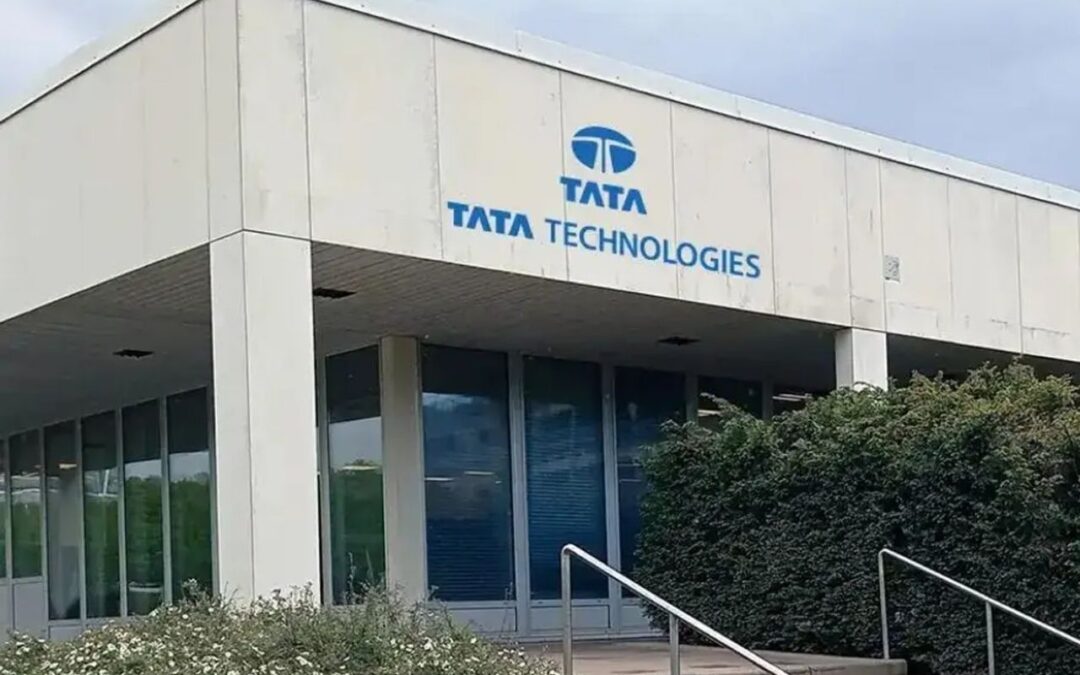Synopsis:
The stock has fallen sharply from its listing highs as slowing growth, margin pressures, and heavy reliance on key auto clients weigh on sentiment. Although near-term recovery looks challenging, expanding digital capabilities, new deals, and improving demand trends could gradually support a medium-term turnaround toward re-rating.
Tata Technologies has seen a steep decline since its strong market debut, losing over 44% from its listing price of Rs 1,200. Now trading in the range of Rs 670-680 levels, the stock reflects weakened sentiment driven by slowing growth, margin pressures, and high client dependence. Its market value has shrunk to Rs 27,673 crore, signalling prolonged investor caution.
Growth Losing Steam
Tata Technologies’ quarterly sales show a largely stable but slow-moving trend. Revenue fluctuates between Rs 1,244 crore and Rs 1,323 crore in recent quarters, indicating limited growth momentum. After peaking at Rs 1,317 crore in December 2024, sales softened slightly before recovering. Overall, the company shows resilience but lacks strong, consistent top-line acceleration.
Furthermore, profit and operating margins reflect pressure on profitability. Operating profit has moderated from Rs 250 crore in June 2023 to the Rs 200–234 crore range recently. OPM has softened from 20% to nearly 16%, signalling rising costs or weaker pricing power. Net profit remains volatile, indicating inconsistent earnings strength despite a stable revenue base.
Tata Technologies shows strength in non-auto verticals like aerospace and industrial machinery, but its heavy dependence on Tata Motors and JLR remains a structural risk. With ~34% of FY24 revenue coming from these two clients (CareEdge), any slowdown or strategic shift at TML or JLR directly affects TTL’s growth visibility. As both automakers face their own operational and market challenges, TTL’s revenue concentration limits stability, dampens margins, and heightens investor caution despite its broader capabilities.
JLR’s strategic tightening of product investments and growing pressure in key markets like China have complicated the outlook for Tata Technologies. With JLR openly guiding for margin cuts, analysts expect a spillover effect on TTL. If JLR reduces spending further, Tata Technologies’ auto services revenue—its largest segment—may stay subdued for several more quarters, limiting near-term growth visibility.
Emerging Positives Ahead
Tata Technologies continues to secure strong deal wins, and its BMW joint venture is scaling up faster than anticipated, adding to long-term confidence. Acquisitions like Es-Tec further enhance engineering capabilities. Despite a soft Q3, management remains optimistic, with CEO Warren Harris expecting a solid Q4 rebound, though near-term challenges may persist.
Abhinav Tiwari of Bonanza offers a more optimistic view, noting that Tata Technologies’ focus on operational discipline and selective, strategic investments signals management’s confidence in a medium-term revival. He believes that despite near-term volatility, the current valuation provides a compelling opportunity for investors prepared to withstand the sector’s cyclical challenges and wait for recovery.
Looking ahead, Tata Tech is sharpening its focus on digital engineering, smart manufacturing, GenAI, and automotive software segments, well-positioned for future demand. Analysts note that once global uncertainties ease, these capabilities can unlock stronger growth. Despite ongoing sector challenges, Tata Tech’s diversified order book and solid client relationships provide a foundation for a steady medium-term recovery.
Conclusion
Tata Technologies’ path back to Rs 1,000 depends on easing client pressures, stronger margin recovery, and sustained growth beyond Tata Motors and JLR. While near-term challenges may cap upside, long-term drivers like digital engineering, GenAI, and new deals support gradual improvement. A decisive re-rating is likely only with consistent earnings revival.
Written by Abhishek Singh
Disclaimer

The views and investment tips expressed by investment experts/broking houses/rating agencies on tradebrains.in are their own, and not that of the website or its management. Investing in equities poses a risk of financial losses. Investors must therefore exercise due caution while investing or trading in stocks. Trade Brains Technologies Private Limited or the author are not liable for any losses caused as a result of the decision based on this article. Please consult your investment advisor before investing.


